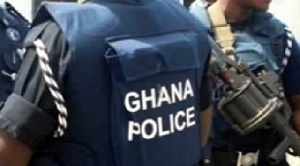 The police command recently justified the shooting of 7 people suspected to be armed robbers
The police command recently justified the shooting of 7 people suspected to be armed robbers
It is very unfortunate regarding the incident at Manso Nkwanta in the Ashanti Region where 7 people suspected to be armed robbers were gunned down by the police. There are a lot of lessons to be learnt from this incident, especially regarding the conduct of the police.
In the first place, there are two or more perspectives to an issue. Right now there are apparently no witnesses to tell us what really happened. The police have told their side of the incident and it seems to exonerate them: that is to be expected. What the police should have done was to protect the integrity of the crime scene so that investigations could be conducted to unravel what really took place.
No, this did not happen and the dead have been removed from the scene, making it difficult to conduct any forensic investigations. What were the positions of the dead? Were they sitting in the vehicles? Were they trying to escape? Where are the spent bullets the police claim the alleged armed robbers fired? Were the spent bullets really fired from the guns found in the possession of those who died? These questions are difficult to answer if the crime scene is interfered with. If it is not their policy yet, the police should protect crime scenes, especially, when it involves homicide. This is likely to assist unravel the truth and increase the public’s confidence in the police.
Second, another very important issue has to do with the police removing the supposedly dead people from the crime scene and taking them to their police stations. It is assumed that the police will only shoot people if they are a direct threat to the police or the public. The police will also shoot someone if they are a potential threat to anyone. In essence, the police shoot people to prevent them from harming others and not necessarily to kill them.
However, if in the process of disabling suspected criminals, the police shoot them and they die, the police are absolved of any wrongdoing. The police should call a medical response team to resuscitate people they shoot because they are not desirous of their deaths.
However, it is a travesty when the police shoot people and bundle suspected criminals into the buckets of their pickups without any means of ascertaining that they are really dead. Such scenes are reminiscent of war situations. The police are not medical personnel and cannot be absolutely certain that a suspected criminal who has been shot is really dead. In some cases it is obvious (example, when half of the person’s face is blown off).
Carting people who have been shot to the police station instead of the hospital is likely to lead to the death of those who might have been in a coma or a similar state. History is replete with stories of people who have been shot multiple times and have survived. Conveying people who have been shot to the police station seem to create the impression that the police really want those people dead.
It is advocated that in the future, if someone is shot, the police should call the ambulance service or convey them to the hospital if the ambulance service is not readily available. If it is very obvious that the person is dead, then the bodies should be left in situ to preserve the integrity of the crime scene. Even in that case medical personnel should be available to certify the demise of the person.
Third, the police should not be overly eager to parade people who have been shot to the public. Preliminary investigations should be conducted before such actions are taken. There are many instances of the police shooting people by mistake and usually those who did the shooting are likely to want to protect themselves by not telling the truth. In such instances, relatives of the victims go through much trauma and sometimes ridicule, especially if the reported story that led to their deaths involves a serious deviant act. Bad news travel fast!
Lastly, the government must come out with an independent investigative body that will monitor activities of the police to reestablish public trust in the service. The practice of the police investigating themselves does very little to assure the public that justice will be served.
For example, in the news conference organised by the police on the incident of the shooting to death of the 7 people, the commander said the 7 killed were those who recently murdered a police officer. He did not provide any evidence for his assertion.
What about if it is found that the 7 killed were not those who killed the policeman? Does the commander get to keep his job? Will he be in trouble for lying to the public? Integrity is key to the people who enforce the law!
A disciplined and a corrupt-free police force is certainly integral to the development of mother Ghana.